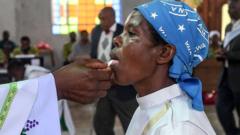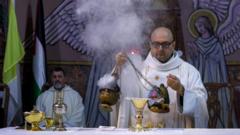Pope Francis, elected in March 2013, marked a historic moment as the first non-European and South American pope, embodying a shift towards recognizing the importance of the global south in the Catholic Church. His leadership emerged amid significant challenges facing the Church, including a moral crisis and increasing competition.
Reflecting on Pope Francis' Historic Election: A Turning Point for the Catholic Church

Reflecting on Pope Francis' Historic Election: A Turning Point for the Catholic Church
An analysis of the significance and impact of Pope Francis' election in March 2013, marking a pivotal moment for the global Catholic community.
In March 2013, Jorge Mario Bergoglio, a cardinal from Argentina, made history by becoming the 266th pope of the Roman Catholic Church, adopting the name Francis. His election was notable not only for being the first pope from South America but also the first non-European pope in over 1,200 years, as well as the first leader from the Jesuit order.
The choice of Bergoglio sent a clear message from the cardinals—the future of the Catholic Church was rooted significantly in the global south, where a majority of its followers reside. Born to Italian immigrants and raised in Buenos Aires, the then-76-year-old pontiff was celebrated for his humility, advocacy for the poor, and commitment to austere living, embodying the ideals of service and simplicity.
Upon taking office, Pope Francis inherited an institution grappling with critical issues: a declining number of priests, escalating challenges from evangelical movements in the Southern Hemisphere, and a traumatic sexual abuse scandal that severely undercut the Church’s moral authority in the West. Additionally, he faced the complex task of navigating Vatican governance amidst internal strife.
The conclave leading up to his election involved extensive deliberations among the world's cardinals, who weighed the Church’s pressing issues and the qualities desirable in its next spiritual leader. Cardinal Christoph Schönborn of Vienna encapsulated the weight of this decision by highlighting the essence of the papacy as "the spiritual head of a community of believers," differentiating it from a corporate executive role.
This pivotal moment continues to resonate, as Pope Francis navigates the multifaceted environment of modern-day Catholicism, emphasizing the need for a Church attuned to the realities and aspirations of its global congregation.





















